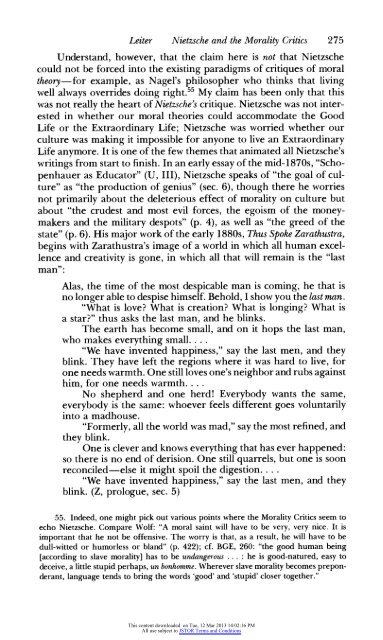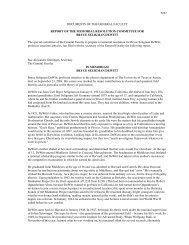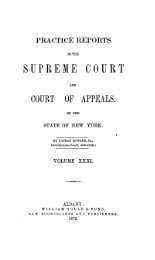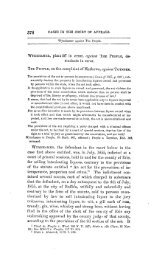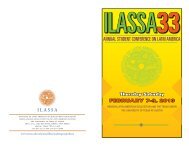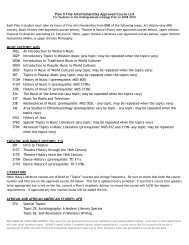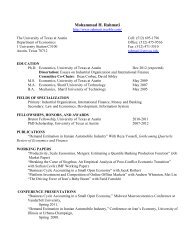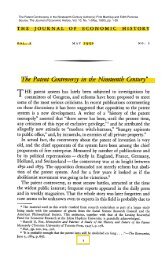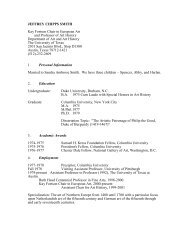Nietzsche and the Morality Critics - The University of Texas at Austin
Nietzsche and the Morality Critics - The University of Texas at Austin
Nietzsche and the Morality Critics - The University of Texas at Austin
You also want an ePaper? Increase the reach of your titles
YUMPU automatically turns print PDFs into web optimized ePapers that Google loves.
Leiter <strong>Nietzsche</strong> <strong>and</strong> <strong>the</strong> <strong>Morality</strong> <strong>Critics</strong> 275Underst<strong>and</strong>, however, th<strong>at</strong> <strong>the</strong> claim here is not th<strong>at</strong> <strong>Nietzsche</strong>could not be forced into <strong>the</strong> existing paradigms <strong>of</strong> critiques <strong>of</strong> moral<strong>the</strong>ory-for example, as Nagel's philosopher who thinks th<strong>at</strong> livingwell always overrides doing right.55 My claim has been only th<strong>at</strong> thiswas not really <strong>the</strong> heart <strong>of</strong> <strong>Nietzsche</strong>'s critique. <strong>Nietzsche</strong> was not interestedin whe<strong>the</strong>r our moral <strong>the</strong>ories could accommod<strong>at</strong>e <strong>the</strong> GoodLife or <strong>the</strong> Extraordinary Life; <strong>Nietzsche</strong> was worried whe<strong>the</strong>r ourculture was making it impossible for anyone to live an ExtraordinaryLife anymore. It is one <strong>of</strong> <strong>the</strong> few <strong>the</strong>mes th<strong>at</strong> anim<strong>at</strong>ed all <strong>Nietzsche</strong>'swritings from start to finish. In an early essay <strong>of</strong> <strong>the</strong> mid-1870s, "Schopenhaueras Educ<strong>at</strong>or" (U, III), <strong>Nietzsche</strong> speaks <strong>of</strong> "<strong>the</strong> goal <strong>of</strong> culture"as "<strong>the</strong> production <strong>of</strong> genius" (sec. 6), though <strong>the</strong>re he worriesnot primarily about <strong>the</strong> deleterious effect <strong>of</strong> morality on culture butabout "<strong>the</strong> crudest <strong>and</strong> most evil forces, <strong>the</strong> egoism <strong>of</strong> <strong>the</strong> moneymakers<strong>and</strong> <strong>the</strong> military despots" (p. 4), as well as "<strong>the</strong> greed <strong>of</strong> <strong>the</strong>st<strong>at</strong>e" (p. 6). His major work <strong>of</strong> <strong>the</strong> early 1880s, Thus Spoke Zar<strong>at</strong>hustra,begins with Zar<strong>at</strong>hustra's image <strong>of</strong> a world in which all human excellence<strong>and</strong> cre<strong>at</strong>ivity is gone, in which all th<strong>at</strong> will remain is <strong>the</strong> "lastman":Alas, <strong>the</strong> time <strong>of</strong> <strong>the</strong> most despicable man is coming, he th<strong>at</strong> isno longer able to despise himself. Behold, I show you <strong>the</strong> last man."Wh<strong>at</strong> is love? Wh<strong>at</strong> is cre<strong>at</strong>ion? Wh<strong>at</strong> is longing? Wh<strong>at</strong> isa star?" thus asks <strong>the</strong> last man, <strong>and</strong> he blinks.<strong>The</strong> earth has become small, <strong>and</strong> on it hops <strong>the</strong> last man,who makes everything small...."We have invented happiness," say <strong>the</strong> last men, <strong>and</strong> <strong>the</strong>yblink. <strong>The</strong>y have left <strong>the</strong> regions where it was hard to live, forone needs warmth. One still loves one's neighbor <strong>and</strong> rubs againsthim, for one needs warmth....No shepherd <strong>and</strong> one herd! Everybody wants <strong>the</strong> same,everybody is <strong>the</strong> same: whoever feels different goes voluntarilyinto a madhouse."Formerly, all <strong>the</strong> world was mad," say <strong>the</strong> most refined, <strong>and</strong><strong>the</strong>y blink.One is clever <strong>and</strong> knows everything th<strong>at</strong> has ever happened:so <strong>the</strong>re is no end <strong>of</strong> derision. One still quarrels, but one is soonreconciled-else it might spoil <strong>the</strong> digestion...."We have invented happiness," say <strong>the</strong> last men, <strong>and</strong> <strong>the</strong>yblink. (Z, prologue, sec. 5)55. Indeed, one might pick out various points where <strong>the</strong> <strong>Morality</strong> <strong>Critics</strong> seem toecho <strong>Nietzsche</strong>. Compare Wolf: "A moral saint will have to be very, very nice. It isimportant th<strong>at</strong> he not be <strong>of</strong>fensive. <strong>The</strong> worry is th<strong>at</strong>, as a result, he will have to bedull-witted or humorless or bl<strong>and</strong>" (p. 422); cf. BGE, 260: "<strong>the</strong> good human being[according to slave morality] has to be undangerous ... : he is good-n<strong>at</strong>ured, easy todeceive, a little stupid perhaps, un bonhomme. Wherever slave morality becomes preponderant,language tends to bring <strong>the</strong> words 'good' <strong>and</strong> 'stupid' closer toge<strong>the</strong>r."This content downloaded on Tue, 12 Mar 2013 14:02:16 PMAll use subject to JSTOR Terms <strong>and</strong> Conditions


